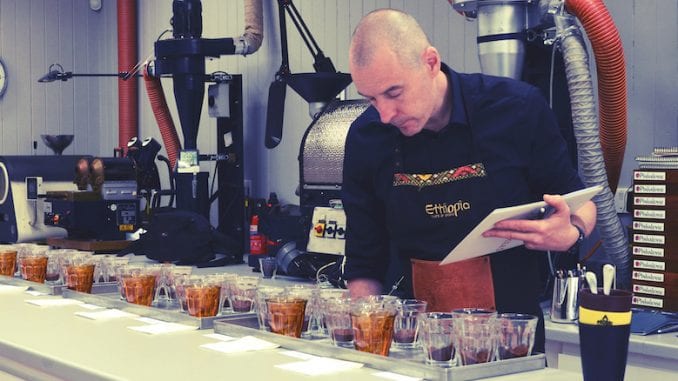
We explore how the competition’s organizers used some creativity and adaptability to hold COE Ethiopia amid the pandemic.
BY CHRIS RYAN
BARISTA MAGAZINE ONLINE
Photos courtesy of Alliance for Coffee Excellence
Since 1999, Cup of Excellence (COE) has hosted coffee-quality competitions in producing countries around the world, rewarding farmers’ high-quality coffee with top-dollar prices. The competition had hosted events in 12 countries, but until this year, had never held a COE in Ethiopia, the birthplace of coffee. That was set to change in the spring of 2020, with the long-awaited first Cup of Excellence in Ethiopia.
And then the COVID-19 pandemic happened. While coffee events were far from the most important thing to be affected by the virus, most were canceled as people stayed home to prevent the spread of COVID-19. For Cup of Excellence, the event’s organizers, the nonprofit Alliance for Coffee Excellence (ACE), were faced with a question: Can we conduct Cup of Excellence Ethiopia remotely to recognize extraordinary coffees and the farmers who grew them while minimizing risk to all involved in the competition?
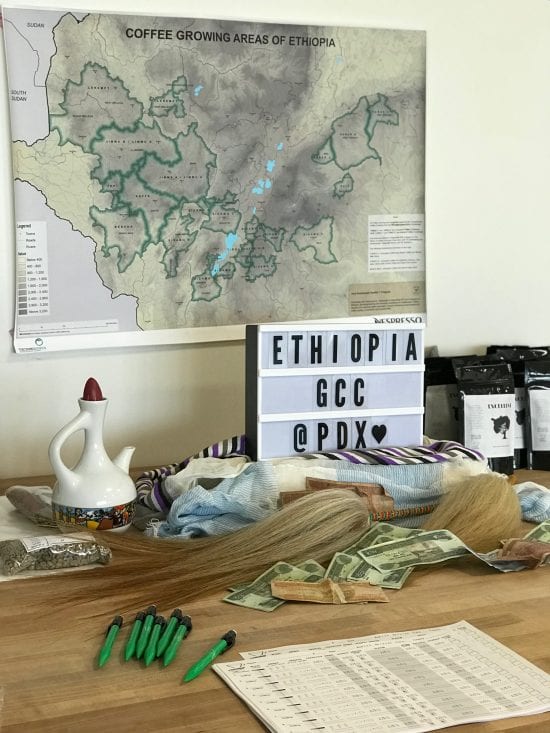
Let’s first fast-forward to say the answer to that question was “yes”—ACE partnered with the Ethiopian Coffee and Tea Authority and USAID’s Feed the Future Ethiopia Value Chain Activity to hold a successful Cup of Excellence Ethiopia in May that was won by Sidama farmer Nigussie Gemeda, whose sun-dried natural earned a score of 91.3. (Keep an eye out for an upcoming interview with Nigussie on Barista Magazine Online.) The winning coffees from COE Ethiopia will be auctioned June 25.
But to understand how COE Ethiopia differed from other events, we first must look at how a typical Cup of Excellence operates. Usually, farmers submit their coffees, and a COE representative flies to that country to oversee pre-selection of the coffees, followed by an evaluation by a national jury, which cups through the pre-selected entrants to determine a large group of coffees (usually 50 to 100) that the international jury will later evaluate in that country to determine the top entrants.
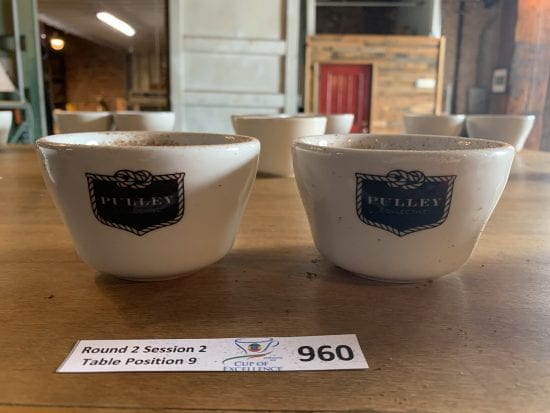
This year, only the pre-selection stage of the competition happened in Ethiopia: COE head judge Paul Songer and supporting head judge John Thompson traveled to Addis Ababa in February to work with 16 national judges to cup through the 1,400+ samples submitted by farmers in Ethiopia to narrow them down to 150. Says Paul, “We held about three weeks or so of training so that the auditing, warehouse management, roasting technicians, and sample preparation staff all understood the requirements and were coordinated with each other.”
However, once the pandemic hit, the COE team could no longer travel to Ethiopia to hold the competition, and the national judges were no longer able to fulfill their role. “The efforts put forth by the staff and cuppers were amazing, and it was not easy with this number of samples,” Paul says. “It was disappointing to me that they could not see the entire project through.”
As a substitute for the national jury, Paul (acting as head judge), Ricky Dyson of Campos Coffee, and ACE executive director Darrin Daniel cupped through the samples qualified by Paul, John, and the Ethiopian jury to determine the top 40 coffees for the competition. Next, the final coffees were sent to COE judges around the world—including COE cofounder Silvio Leite in Brazil, Eduardo and Edwin Ambrocio in Guatemala, and Erwin Mierisch in Nicaragua—to evaluate in their respective labs around the globe.
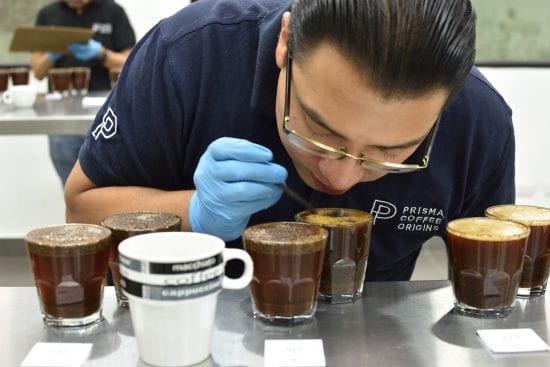
To no one’s surprise, the top coffees were fruity, full of flavor, and extremely clean and clear. “As someone who served as a judge for the Portland lab here at ACE, I was amazed at the cleanliness of the naturals, the experimentation lots of anaerobic, and the overall quality level,” says Darrin. Eduardo says he discovered flavors he’d never before tasted in Ethiopian coffees. “The complexity and uniqueness of these coffees really stood out,” he says. “One profile in particular was reminiscent of clove, sweet and spicy with a buttery, thick texture. Yet it was fruity and lively. I have only tried a coffee like this once in my life.”
Paul says that while the Ethiopian mainstay of natural coffees made up most of the top entrants, there was still diversity in the processing methods. “Most of the samples submitted were naturally processed (locally usually referred to as sun-dried), and the variable conditions of fruitiness development become responsible for flavor attributes along with the conditions of soil, climate, and cultivation,” he says. “There were several washed coffees as well that were clean, sweet, and full-flavored. In sum, a wide variety of flavor profiles, with each having its own unique character.”
Paul says that while he’s confident the “national jury” method used for this competition chose the best coffees submitted, he’s disappointed ACE didn’t get to discover which coffees the Ethiopian jury would have chosen. “As the oldest origin of coffee, coffee is grown in many individual regions in Ethiopia and the national jurors from different regions had not experienced all of the flavor attributes of the submitted coffees, especially those utilizing experimental processing methods such as anaerobic,” he says. “It would have been interesting to see their final judgment of these coffees and the choices made.”
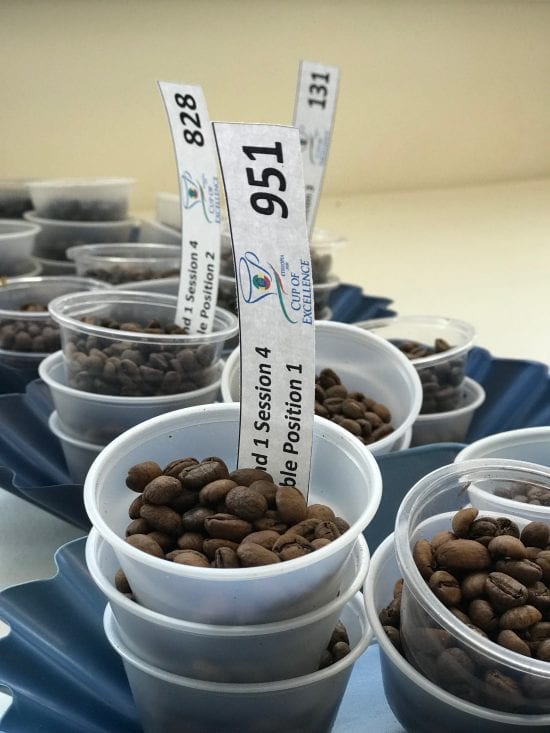
The upcoming June 25 auction for the COE Ethiopia winners has already generated much attention, with more than 135 international buyers registered—the highest number of registered bidders of any COE auction.
With the model of evaluation used for COE Ethiopia having proven successful, ACE is shifting to remote evaluations for at least some of its upcoming 2020 COE schedule. The evaluations will take place at Global Coffee Centers (GCCs) at judges’ labs around the world—an idea ACE landed on from farmers’ and members’ feedback. Darrin says ACE worked closely with Paul, longtime COE judge Scott Conary, and ACE senior manager Erin Wang on the phytosanitary processes to be followed at the GCCs to mimic techniques used historically at COE competitions.
“This will be our process as we go through the Central America competitions, and we may employ this process into South America depending on the pandemic,” Darrin says. “We are also considering globalizing our jury process for 2021 in a similar manner as what we had to do as we pivoted through this year. We have learned a lot about how we can have an in-country jury and a global jury, which would give us a larger dataset and allow for many other experienced tasters to be a part of the community. We have to look into how this year goes to determine how we might refine this for a 2021 expanded process.”

